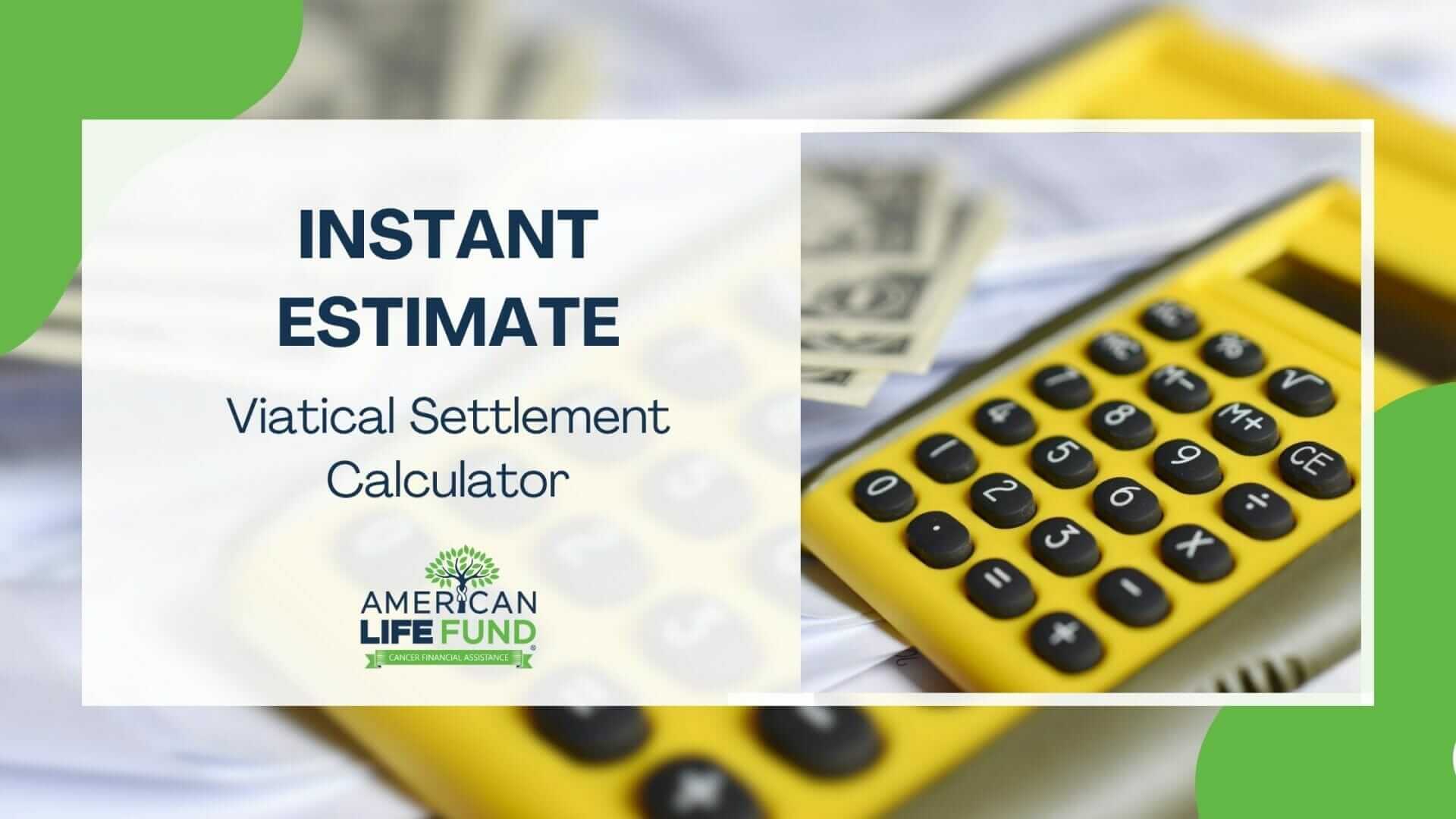You may find yourself needing money during difficult times, especially when dealing with life-threatening illnesses or health issues. But how can you determine the potential value of your life insurance policy in such circumstances?
Enter the viatical settlement calculator, a tool designed to help you estimate the value of your life insurance policy in a viatical settlement. These calculators provide you with the information needed to make an informed decision about accessing much-needed funds.
In this article, we will discuss how viatical settlement calculators work, reviewing the factors contributing to the viatical settlement value, and offer tips for maximizing your settlement. We will also outline eligibility requirements and address the legal and tax considerations associated with viatical settlements.
Quick Read
Viatical settlement calculators estimate the value of life insurance policies during the life settlement process, using factors such as age, gender, health status, and policy type.
- Maximizing your viatical settlement involves researching multiple offers, negotiating with companies or providers, and seeking professional advice.
- Eligibility for a viatical settlement requires meeting certain health conditions and having a minimum policy size.
- Legal and tax considerations are important in viatical settlements, with potential tax exemptions under certain conditions and varying state regulations and licensing requirements.
- Maximizing your viatical settlement value is achieved by maintaining open communication with providers, being prepared for negotiation, and seeking advice from a credible viatical settlement broker or tax advisor.
Eligibility Requirements for Viatical Settlements
To qualify for a viatical settlement, certain eligibility requirements must be met. These include:
- Having a serious or life-threatening illness or significant health issue.
- Having a minimum policy size of $200,000 or more.
In general, the minimum life insurance proceeds necessary for a viatical settlement is $200,000. Almost all policy types are eligible for sale, including:
- Whole life
- Term life
- Joint
- Group (Employer-Issued)
- Universal life insurance policies
Understanding viatical settlement eligibility is key when considering a viatical settlement to get the best possible outcome for your unique situation.
Why Would You Need to Calculate the Value of your Life Insurance Policy?
In uncertain times, understanding the value of your life insurance policy is important. Calculating its worth allows you to assess your financial options, especially when facing unexpected expenses due to health issues. By knowing the value of your policy, you can make decisions about accessing funds for medical treatments, covering bills, or providing financial security for family members.
How Viatical Settlement Calculators Work
Viatical settlement calculators use a combination of factors to estimate the value of your life insurance policy in a viatical settlement. These factors include:
- Your age
- Your health status
- Your policy type
- Your life insurance policy amount
Upon entering this information, the calculator will determine an approximate value for your policy based on industry standards and actuarial tables.
Keep in mind that calculators may rely on different mathematical formulas to produce their estimates. However, most calculators rely on the same core factors to provide an estimate of the policy’s present value and potential payout to the policyholder.
Benefits of Using a Viatical Settlement Calculator
- Quick Estimate: Viatical settlement calculators provide a swift estimate of your policy’s potential value in a viatical settlement, saving you time and effort. This allows you to make informed decisions about pursuing a viatical settlement without delay.
- Privacy Maintenance: These calculators guarantee your privacy by offering estimates without requiring you to divulge personal information to a third party. This protects your confidentiality while still providing valuable insights into your policy’s potential value.
- Comparison Capability: Using a viatical settlement calculator allows you to compare multiple offers from different providers. By securing multiple estimates, you can identify the most competitive offer and negotiate for favorable terms and better payouts. This empowers you to maximize the value of your policy.
Factors Affecting Viatical Settlement Value
Several factors affect the value of a viatical settlement, including:
- Your health status and life expectancy
- The type and features of your life insurance policy
- The life insurance proceeds amount.
- Understanding these factors helps you make an informed decision about whether a viatical settlement is the right option for you and how to maximize the value of your policy.
Bear in mind that each life settlement transaction is unique, and the life settlement value of your policy fluctuates based on specific circumstances. Working with a specialized viatical settlement company will help you manage the process and receive the best possible offer for your policy.
Health Status and Life Expectancy
Your health status and life expectancy are key to determining the value of a viatical settlement. In general, shorter life expectancies result in higher payouts, as the policy buyer will receive the life insurance proceeds with fewer premium payments for them to pay. Common health conditions that affect the value of viatical settlements include:
- Life-threatening illnesses such as cancer or ALS
- Chronic illnesses that impede daily functioning such as:
- Heart attack
- Alzheimer’s Disease
- Major organ conditions
When calculating life expectancy for viatical settlements, providers estimate how long the insured individual is likely to live. The amount of the viatical settlement depends on the seller’s life expectancy.
Policy Type and Features
The type and features of your life insurance policy also impact the value of a viatical settlement. Factors that increase the value of a viatical settlement include a larger face value of the policy and a lower premium payment. Factors that decrease the value of a viatical settlement include a smaller face value of the policy, a higher life expectancy of the policyholder, and a higher premium payment.
Policy loans are another factor when evaluating viatical settlement offers, especially when premium payments are involved. Any unpaid loan amount will be deducted from the life insurance proceeds if the policyholder passes away before repaying the loan. This affects the overall value of the viatical settlement and should be considered when negotiating with providers or companies.
Eligible policy types for viatical settlements include:
- Whole policies
- Universal policies
- Term policies
- Variable policies
- Group policies
- Joint Policies
Life Insurance Proceeds Amount
The life insurance proceeds amount is a key factor in determining the value of a viatical settlement. Larger policies generally yield higher payouts, as the face value of the policy is a part of the overall value in a viatical settlement transaction. The typical range of the life insurance proceeds amount for a viatical settlement can be up to 70% of the face value of the policy.
When considering offers from viatical settlement companies, it’s important to remember that the death benefit amount is not the only factor influencing the value of the settlement. The policyholder’s life expectancy, health status, and policy type are also considered for the final life insurance payout.
Comparing Viatical Settlement Offers
Comparing viatical settlement offers is an important step in selling your life insurance policy. By evaluating offers from different providers and negotiating the best possible deal, you can maximize the value of your viatical settlement and guarantee you receive a fair offer for your policy.
Be prepared to ask questions and gather information about the provider’s reputation. These factors will help you determine the provider’s reliability and trustworthiness, promising a smooth and successful transaction.
Evaluating Offers
When assessing viatical settlement offers, pay attention to factors like the provider or company’s reputation. A provider or company with a positive reputation is more likely to offer:
- Competitive prices
- A seamless transaction process
Another important factor to consider when evaluating offers from a life insurance company is the policyholder’s life expectancy and the face value of the policy. By comparing multiple offers and taking these factors into account, you should receive a fair and accurate offer for your life insurance policy.
Negotiating with Companies
Negotiating with a life settlement company or provider is a necessary part of maximizing the value of your viatical settlement. Through open and honest communication, your needs and preferences will be clearly understood and considered during the negotiation process.
Legal and Tax Considerations
When considering a viatical settlement, consult with a professional tax advisor or legal counsel to comply with all relevant laws and regulations. This helps you avoid potential pitfalls and maximize the benefits of your viatical settlement.
Tax Exemptions for Viatical Settlements
Viatical settlements may qualify for tax exemption under specific conditions. According to the Health Insurance Portability and Accountability Act (HIPAA), settlements made to individuals with life-threatening illnesses and life expectancies of less than two years are entirely tax-free!
However, the tax on viatical settlements varies depending on the particulars of the settlement agreement and the specific circumstances. It’s important to consult IRS guidelines and seek professional advice to guarantee compliance with tax laws and regulations.
State Regulations and Licensing Requirements
State regulations and licensing requirements for viatical settlements differ, making it important to verify the licensing of the provider or broker you’re working within your state. In some states, viatical settlement providers, brokers, and investment agents must obtain a license to meet specific regulatory standards and adhere to ethical practices. This protects policyholders, ensuring they receive a reasonable offer for their life insurance policy.
Learn more on viatical settlement Laws.
Tips for Maximizing Your Viatical Settlement Value
For maximizing your viatical settlement value, consider these tips:
- Maintain open communication with providers
- Stay ready for negotiation
- Seek advice from a credible tax advisor
By following these tips, you can feel confident that you will receive the best possible offer for your life insurance policy.
Ready to take the next step? Use our viatical settlement calculator at American Life Fund to get started on your path towards financial security and peace of mind.
Summary
During hardships caused by health issues, Viatical settlements offer a helpful financial solution. By using viatical settlement calculators, understanding the factors affecting settlement value, and comparing offers, you can make an informed decision about whether a viatical settlement is the right option for you.
Consult with a professional tax advisor or legal counsel to guarantee compliance with all applicable laws and regulations. By following the tips in this article, you will maximize your viatical settlement value and gain the financial relief you need during a challenging time.
How much can you get for a viatical settlement?
You can typically receive 30-70% of the face value of your policy for a viatical settlement.
How are life settlements calculated?
Life settlements are calculated by multiplying the annual premium amount by the insured person’s estimated life expectancy in years, taking into consideration any future premiums until the policy matures upon the passing of the insured.
How accurate are online life settlement calculators?
Online life settlement calculators provide estimates based on the information you input, but the accuracy can vary. For a more precise valuation, consider consulting with a specialized viatical settlement provider.
Who are life settlement buyers?
Life settlement buyers are individuals or entities that purchase life insurance policies from policyholders in exchange for a lump sum cash payment.







